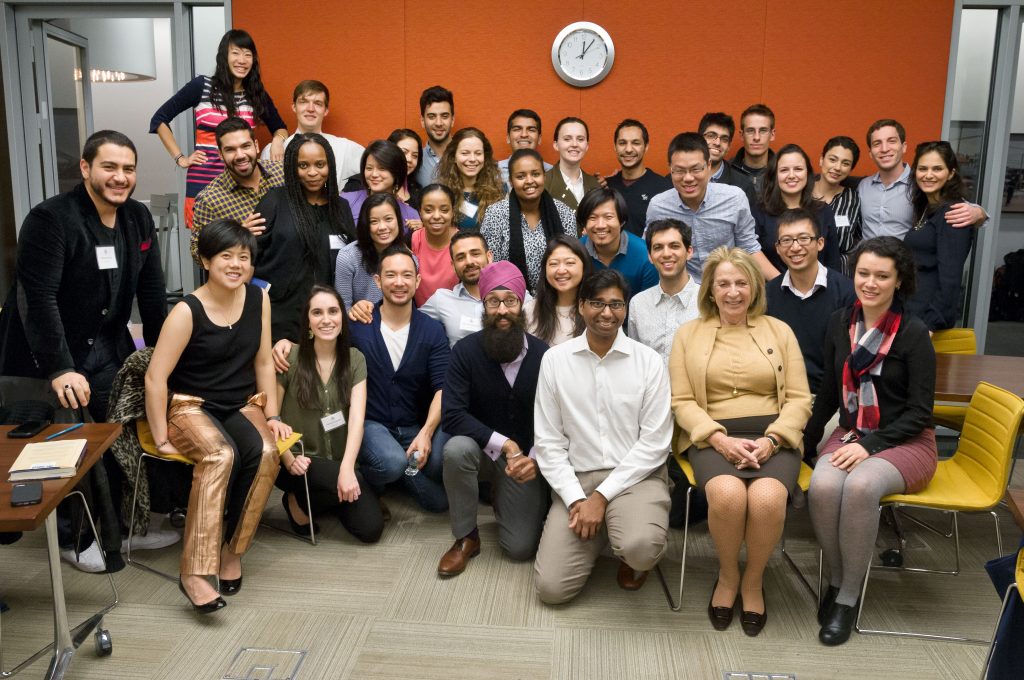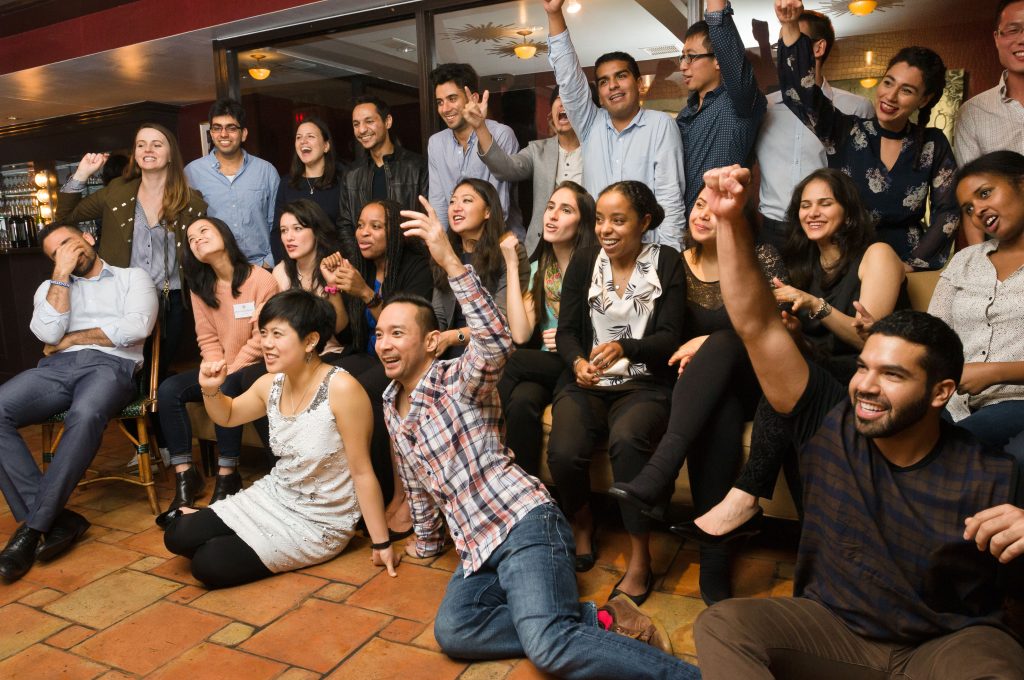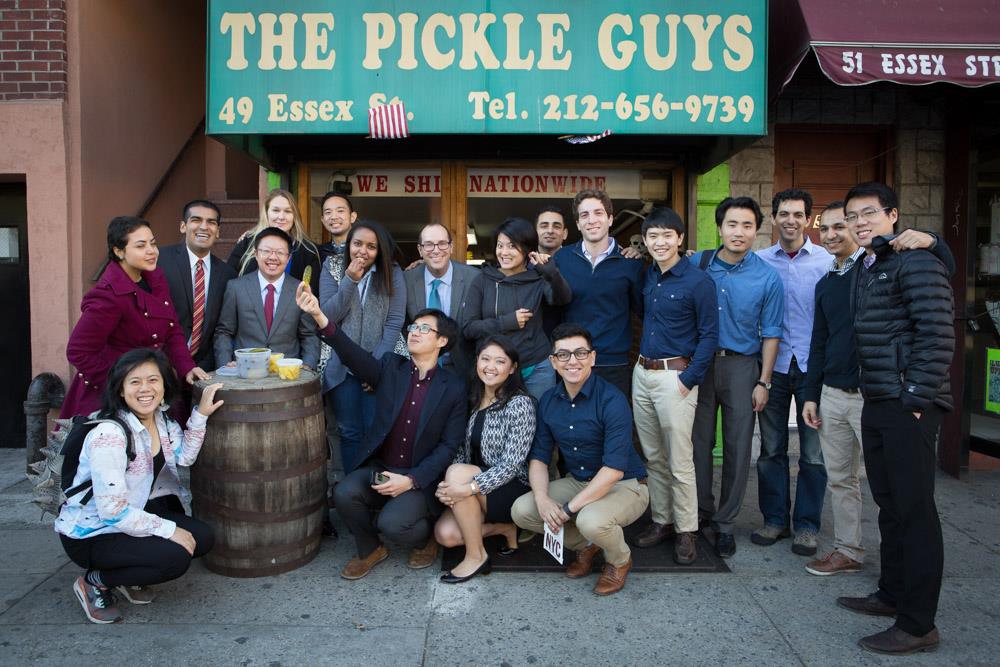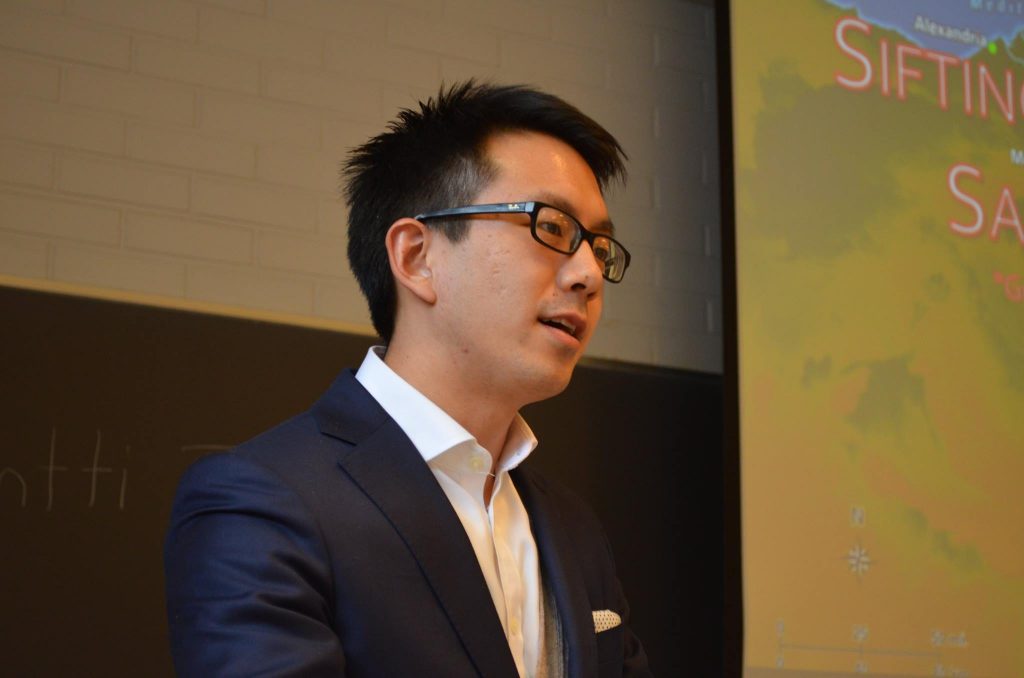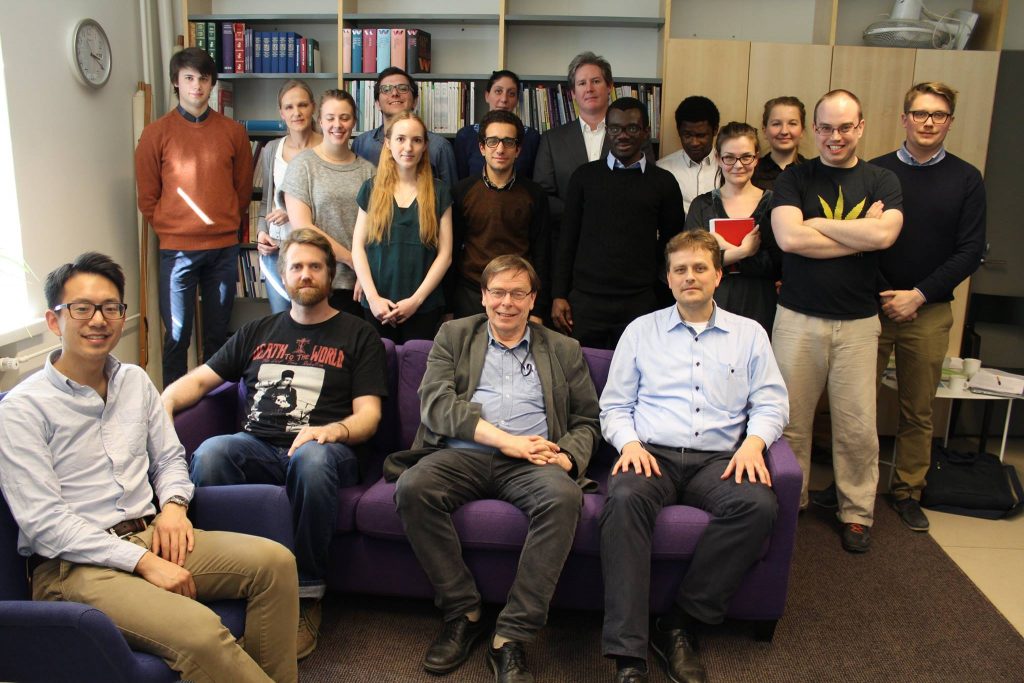Mohamad Abedi-Dinner with the Soros Fellows and President Barack Obama
Mohamad was born to Palestinian refugees in the United Arab Emirates. His family was under the constant threat of deportation back to the refugee camp in Lebanon where they had come from. His parents, lacking strong educations themselves, could not help Mohamad with his school work, but always served as his role models and inspiration.
Growing up, Mohamad spent his summers visiting family in the Beddawi refugee camp in Lebanon, where resources for health care were inadequate. He watched family members struggle with ailments that should have been easily curable, but instead persisted and grew worse. This experience motivated Mohamad to pursue an education in bioengineering, however he felt limited by the range of education options available to him. A world of education options opened up to him when, his senior year, after a ten-year waiting process, his family’s application to the United States was approved. Mohamad was able to pursue a degree in bioengineering at UC Irvine where President Obama distinguished him during a commencement address as someone who knows, “what it means to dream.”
At UC Irvine, he worked on building diagnostic devices for rural areas by designing computers that run on air instead of electricity. Later, he investigated the robustness of bacterial genetic circuits with respect to noise. Recently, Mohamad received the National Science Foundation Graduate Research Fellowship, recognizing him as one of the future leaders in his field.
Mohamad is now pursuing a PhD in bioengineering at Caltech. The long-term goal of his scientific career is to develop tools for non-invasive modulation of brain circuitry, which would allow scientists to understand and treat neurological and psychiatric diseases that involve the dysfunction of local neural circuits. Biography by Mohamad Abedi as posted in the Paul and Daisy Soros Foundation’s Meet the Fellows section.
What was your major at UCI, and how did you learn about the SOROS and the NSF?
When I first transferred from Irvine Valley College to UCI, I wasn’t really sure of what I wanted to do. I was leaning, mostly, toward medical school. But, as I took more classes, I realized I really enjoyed physics and chemistry classes, which led me to think that if I went to medical school I wouldn’t be able to focus on these topics.
I decided to come into UCI as a mechanical engineer major and transferred into that field. Then, I had another change of plans and ended up majoring in biomedical engineering. This way, I could also satisfy the part of me who wanted to be a doctor.
How did I hear about the SOROS fellowship?
When I was at UCI, I worked in a couple of labs doing research. I remember talking to professor Chang Liu and Elliot Hui about applying to graduate school and they recommended that I apply to fellowships and talk to other graduate students about options. I learned about the NSF and I also learned about the SOROS fellowship through them.
Did you visit the SOP office?
I did, when I wanted examples of NSF essays.
Tell us about the SOROS. How did you write a competitive application and sell your case?
The SOROS is a unique fellowship. I would say that they are looking for funding people as opposed to funding ideas. The NSF funds you based on an idea, mostly.
When it comes to the SOROS fellowship, you have to be an immigrant or the son or daughter of an immigrant.
However, what they really look for is more than an immigration story. They want you to show that you are a person who holds great potential to contribute to the United States as an immigrant. They also want to learn about the certain ways in which the United States helped you. In short, in the telling of this story, they want to know that the help an immigrant student received in the United States was life-changing and would not have been possible anywhere else. They also want to attract students who have a clear path to becoming future leaders in their fields.
What is your immigrant story? Where is your family from?
It’s complicated. My family and I are Palestinian refugees.I came to the U.S. as a teenager. I was 17. In the beginning, I stayed with my aunt. A bit later, my sister joined, who is younger than me. As we got more financially stable, another family member would join. My family followed me later. As a virtue of being a refugee, we lived in Lebanon and we applied to come to the US. It was a very long process and toward the end, we got accepted to emigrate here.
How did you craft your story? The SOROS looks for students who value the US Constitution and demonstrate potential for creativity and leadership. What did you tell them that you wanted to do with your life?
One major factor in my case as a refugee was that in other countries, I always felt I was a second-class citizen or even lower. In these countries, we didn’t get a lot of opportunities. This was totally different when I came to the U.S. Here, I was treated as a U.S citizen, even though I wasn’t one at that point.
I was given a lot of opportunities here to be creative and to focus on school. One of the most important benefits was that the US allowed me to be involved in research, which is an opportunity I wouldn’t have received anywhere else. The incredible opportunities I was given in the U.S. have been a major part of my story, and have influenced the path I pursued, and continue to follow today.
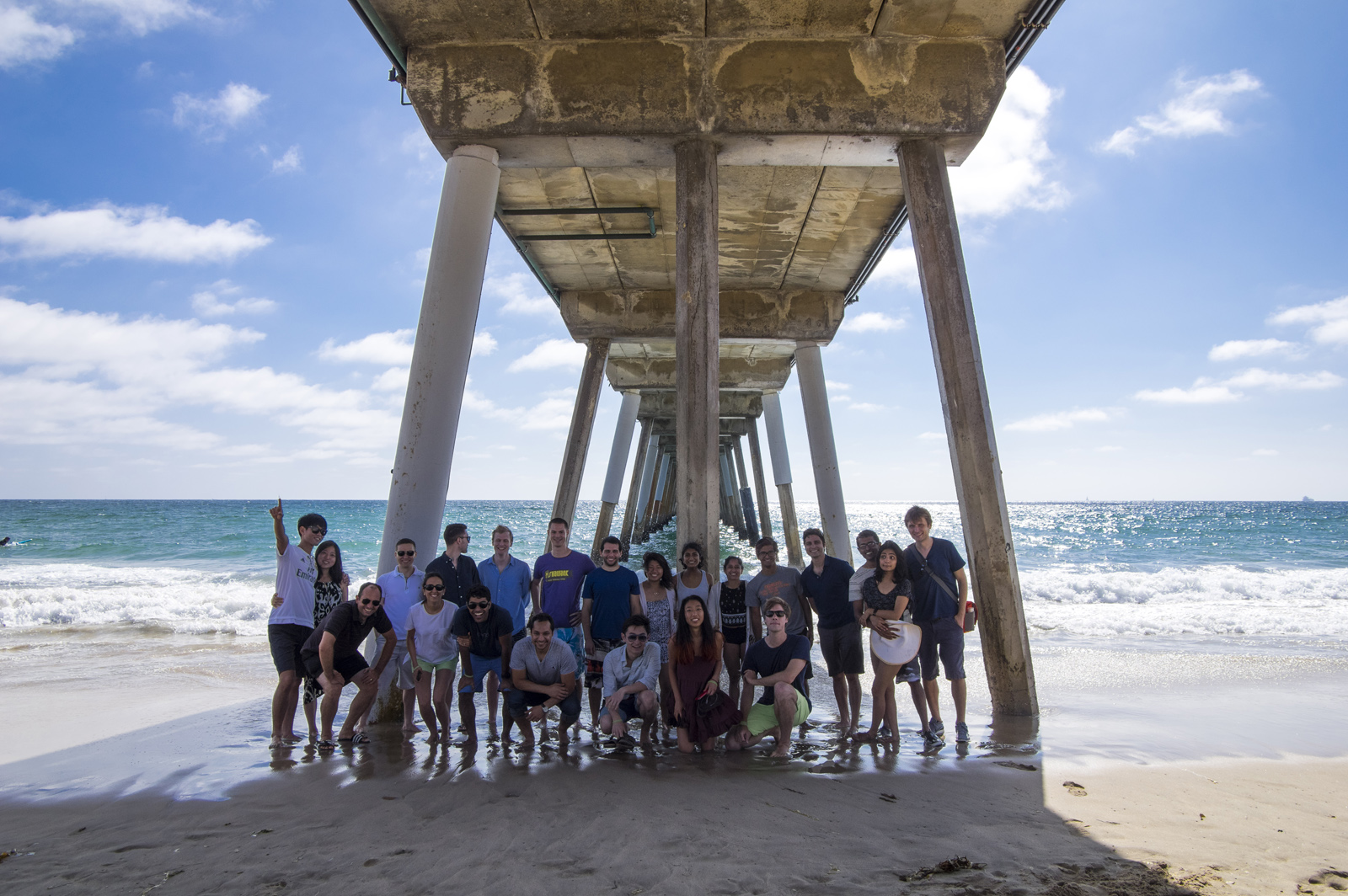
Mohamad and lab partners at Caltech enjoying a day off.
How did the SOROS connect with the NSF project and what did you do for the NSF?
Between applying to the SOROS and the NSF there was a year. When I applied for NSF I was still at UCI. The project that I proposed then was inspired by the research I had done as an undergraduate student. But when I started graduate school I started pursuing a different project.
The one that I proposed for the SOROS fellowship was mainly focused on engineering cells in the brain, a project that was linked to the brain initiative launched by President Obama.
Tell me about the brain initiative that President Obama proposed.
A couple of years ago, the President directed funding of a billion or more (it is roughly half a billion per year and it has been going since 2013) to research the human brain. President Obama launched this initiative referencing that we understand the galaxies around us better than we do our brains. The White House wanted to pave the way towards understanding the brain by driving research towards developing new tools to study the human brain.
What graduate school are you attending?
I am pursuing a PhD in Bio-Engineering at Caltech. I didn’t go too far. I like it here. I’m in the middle of my 3rd year.
What are you working on right now?
Recently, I published a paper that details my work and what I’ll work on in the future.
I’m working on developing proteins that respond to temperature changes. We are creating medicinal proteins intended to heal the body. Currently, people use light to communicate with brain cells, specifically, with neurons. The problem is that to get the light into your brain you have to drill a hole in your skull. The alternative is that you can use ultrasound to focus on a specific region of the brain and heat it without damaging the brain cells. But you also need a receiver that you can install in your cells so that they can respond to heat signals and that is where my work comes in. Through the use of an ultrasound, you don’t have to drill and the light reaches within the brain.
What advice would give a student considering the SOROS and the NSF?
If you are in a STEM field, participate in research. In my case, I ended up liking it so much that I changed my career to be a researcher, which was not my initial goal. Through the process of research, you start learning to be independent; you learn how to solve problems.
Then, if you decide that research is what you want to do, fellowships become important because you can otherwise be limited to work on projects that a professor is working on, especially when the funding is coming from that professor.
On the other hand, if you have a fellowship, like the NSF or the SOROS, you have more freedom of choice regarding which school, which lab and which project you want to work with. It gives you a lot of freedom to do what you care about, which is the biggest plus you get out of these scholarships. This is the case for the NSF.
What is unique about the SOROS is that they really care about people, which is not very common for other fellowships. When you become a SOROS fellow, they fly you every year, for 2 years, to New York where you get to meet with other fellows and discuss major issues with them. You meet people from a lot of different fields. I got to meet musicians, people that work in the business field, people who work in clinical medicine, and many others. It is a great opportunity to meet all these different people who come from all these different fields.
All of us have something in common. We all came to this country as immigrants, and we are all more or less on the path to help advance the field that we are in in this country, which is something really nice and I don’t think could be possible through any of the other fellowship.
How many years have you been flying to New York to meet with the SOROS team?
I’ve been a SOROS fellow for 3 years, and they pay for your expenses to go to New York and stay there for a weekend. It’s usually a combination of fun activities, skill-development, and networking. The aspect of making connections is very nice.
The year before, the U.S. Surgeon General, who is also a SOROS, sat with us and we got to discuss health issues affecting Americans. These are incredible opportunities to meet people that you would otherwise not have the opportunity to meet. These conversations allow you to meet amazing people on a personal level, interact, and build connections.
They book us all in one hotel; they plan every day and they have a schedule, including food, workshops, and talks.
How big is the group?
The way it works is that every year they invite the class that won the fellowship that year and the year before so that’s why I went last year and the year before. Next year, I won’t get a paid invitation. I will have to pay for it myself, but every 10 years or so they have a big conference where everybody is invited.
How does the SOROS conference appeal to the distinct fields? What do you have in common besides being immigrants?
What we all share in common is that regardless of your discipline, SOROS recipients are ambitious, self-driven people who are goal-oriented. They have tall plans and are working to achieve them. These traits, we all share in common, and we appreciate them in others, regardless of the field.
These are more than networking opportunities. You actually become friends. So if they are close to you, you can meet with them regularly in LA, for example, and whenever I fly somewhere, if I know there is a SOROS fellow, I email them or Facebook chat, “I’m around. Do you want to meet up?”
There is a very strong networking component to the SOROS.
What countries or world regions are represented in your class?
A big variety: Middle East, Iran, Egypt, in my case, United Arab Emirates, Europe, Eastern Europe, Asia, China, Taiwan, India, South America.
What did you have to do to apply for the SOROS?
You write 2 essay. One, of your work and your plans for the future, and the other, is about your American experience, your immigration story and why U.S. values are important to you and how you have used those values and opportunities to charge ahead.
Once you send this in, if you are selected, you attend a personal interview, either in New York or LA. They fly you there, and you are interviewed by previous Soros fellows and other people.
When I interviewed, the panel had previous SOROS winners and the Mayor of L.A. was one of the people who interviewed me. From the 70 candidates, they pick 30 to win the fellowship.
What was the interview like? What questions did they ask?
You go through 2 interviews. Each interviewing committee has 4 or 5 interviewers. Questions include: which research are you working on; what do you do in your free time; what’s important to you, other than work.
They are looking for certain type of people. They really want to find out who you are as a whole.
They tailor questions based on your background, and they are really interested in understanding your goals and they ask you lots of personal questions.
Do you remember those?
Yes. They asked, “you told us about your research, you are busy all the time, but do you have something else in your life or do you only do research?” This is the point where they look to see if you are a well-rounded person and that question surprised me.
I told them, I do spend most of my time in lab because for me the lab is fun. It never feels like an obligation. Some people find fun in sports or movies which I do participate in. But for me, working in the lab and interacting with my colleagues is fun, and what I do for fun.
What sense did you get from the interview process? What are they looking for?
They really want people who are showing strong potential in whatever field they are in. They don’t really care about specific types of research. What they care about is that you are a person who in the future will make the fellowship’s name and reputation more prestigious. The more successful you become, the more prestigious the SOROS becomes. They look for the people who have the potential to become successful, to become leaders in whatever they are doing.
It’s not enough to have an immigrant story. It’s important to show how that story affected you and informed the person that you are today. And if that person shows promise, then that’s the person they want to keep as a SOROS fellow.
How has the SOROS process changed you?
I think the biggest advantage, other than the money, is the amazing people I would have never had the chance to meet in my life. These meetings give you new perspectives. They inspire you because they show you what other people are doing with this opportunity and their personal drive. We help each other out to reach these goals. We encourage each other to stay motivated, to stay inspired and to stay connected.
What would you tell a student who is preparing to apply for the SOROS. What should they definitely cover in their essays?
Show that being in the U.S. has helped you become the person that you are. Connect your story to how these opportunties have developed a patriotic spirit for the U.S., that you are on the path to success because of the U.S. and in turn, your success will help the U.S become a better country.
The SOROS is a patriotic fellowship that is interested in making this country better.
They want to see people who have the potential to be successful so in the application and interview it is important to focus on the bigger picture and demonstrate that what you are working on could be useful and impactful for the country as a whole.
Show them that you have a clear path of where you want to be in the future. They don’t want people who are unsure. They want people who have a goal, are driven and know what they need to do to reach that goal.
How did you convince them that you are going to be successful? What are the values of America that you love and that push you to be the best that you can be? How will you give back and be a contributive member of U.S. society?
The first question relates to the American dream. It doesn’t matter where you come from. It doesn’t matter who you are. If you put in the effort and the work, opportunities will be open to you and you will be able to reach what you want.
In other countries, in order to be successful, you have to come from a big family name, or you have to be rich. Over here, when I came to the U.S. my name didn’t mean anything and I wasn’t financially in a good place, but because I was putting in the work and I had a vision, doors opened for me, either through fellowships, scholarships, or assistance. Doors will be open to you to reach your goal as long as you put in the work for it.
The second part, how I convinced them that my project will be impactful, it is very important to have strong letters of recommendation. I can talk all day about who I am and what I plan to do, but it is through the letters verifying that, that the committee can start to see it. When professors write letters making comments like, “I know this person; I’ve seen his work; I know that he will be x y z in the future,” this is really important.
And in my case something else that helped me during graduation from Irvine, was that president Obama during his commencement speech, one of the people he mentioned was my name, Mohammad Abedi came as a refugee and now he is working on his Ph.D. getting an endorsement from the president, saying I got here as a refugee and now he’s going to do great things, helped me a lot in my application for the SOROS.
How did President Obama learn about you?
When the president decided he was coming he had people contact UCI for recommendations. He wanted to mention names. They asked people for profiles and biographies and sent them back to the White House and the White House contacted me a day before to verify information. They said there is no guarantee that he is going to talk about me. When I went to the graduation, I wasn’t even sure. It was great when he mentioned my name.
Any other advice you’d give students thinking about fellowships?
It isn’t only about the grades. Doing research is important, learning how to be a good writer is important. Also important is to seek help, ask for help. There are a lot of nice people who have a lot of information and are very willing to help, but you have to seek them out. Be active about the things that are important. When I wrote my application, I sent it to tons of people; whoever was willing to read my application. Many people write their applications and they are either shy or they don’t want to share it. Get as much feedback as possible.
What is next for you? What do you want to do after you get your degree?
I’m working on completing a Phd so I can start a career as a tenure-track professor. I would love to stay in California. I love the weather here.
Mohamad is available to answer questions about his journey, experiences and life accomplishments. He can be reached at x@caltech.edu
Follow this link to learn about his latest research. To find out more about Mohamad and his partners in Shapiro lab, click here.

PhD, Candidate at Caltech, Mohamad Abedi is an immigrant from the United Arab Emirates. The Soros Fellowship was awarded to support his work towards a PhD in Bioengineering at Caltech
President Obama mentions Mohamad’s accomplishments during his commencement speech.
Kenneth Lai-Fulbright Recipient and Marshall Finalist
Fulbrighters in Jyväskylä
Kenneth Lai graduated from UCI magna cum laude in 2014 with a B.A. in English Literature and a B.A. in Classics, additionally receiving the Chancellor’s Award of Distinction. He completed two UROP projects (2012–2014) under the guidance of James Steintrager. The subject of the former project (H.P. Lovecraft) was the topic of his UTeach classes (2013–2014). After graduating, Kenneth moved to Finland as a Fulbright student at the University of Helsinki to complete his M.A. in Religious Studies and is currently working on a teaching degree in the subjects of English, Latin, and Religion for Finnish public education. In the future, Kenneth hopes to pursue a PhD exploring the missionary practices of Manichaeism, an ancient religion that was practiced from the Roman Empire in the west to Tang China in the east and which now, because of the religion’s wide geographical spread, demands the equal cooperation of western and eastern scholars.
Tell me a little bit about your UCI experience. You were awarded a Fulbright and were a finalist for the Marshall. How did you connect with these opportunities?
I started as an English major and later wanted to learn Greek, so I learned Ancient Greek. My professors told me I was a good classicist, so I ended up double-majoring in English and Classics and graduated Magna Cum Laude. It was really cool because, in my year, we had Obama.
I understand you joined the Campuswide Honors Program and through them, you learned about the Fulbright and SOP.
Yes. I got to know about the CHP in my freshman year, and they exposed me to a lot of scholarship opportunities.
You learn a lot from CHP because the advisors are great and they fill you in on everything. I had Mary Gillis. She has this great memory and really personalizes the process, and I think all the advisors there do that as well. You just learn a lot by being in that environment. Students can be more scholarly-oriented in the honors’ program, and that’s what I have always enjoyed. I have always found it nice to connect with students who appreciate the same.
There are a lot of perks of being in the CHP. In general, it makes you very curious about things.
I think I may have learned about the Fulbright then. They definitely encouraged me to visit SOP.
What was your experience with SOP? Did you come into the office to get feedback for your Fulbright and Marshall applications?
I came in all the time. I was probably an annoying visitor. I went through the applications; I studied them and received good advice from Michelle Tsai.
CHP told me to go to SOP, so I made an appointment and started the application process. I remember it took me a long time.
Tell me about your Fulbright experience.
I was drawn to the Fulbright because I had heard so much about it and I wanted an opportunity to do a Masters somewhere. One of the many Fulbright opportunities is that they allow you to use a Masters Program as a Fulbright project.
Kenneth Fulbright Presentation
How did you narrow down what you would do for your Masters Program?
I wanted to broaden my experience to see if English or Classics, my two undergraduate majors, were the right options for me or another field that I was interested in. I looked for a field that would harmonize the abilities and language skills I developed in either discipline and found the perfect match in Religious Studies.
The Fulbright website lists many options you can pursue, and since I was interested in Finland, I looked into it and found out that there is a strong partnership between the Fulbright program and the University of Helsinki.
In fact, I learned later that Fulbright in Finland was one of the first Fulbright programs to launch, and they have been winning a lot of awards because they have created lots of different Fulbright opportunities, not just for students, but also for teachers in mid-careers who want to gain expertise in a different subject.
Once in Finland, who advised you academically?
It was actually Antti Marjanen. He’s been my main research advisor in Finland and my research project was in partnership with him. Initially, I looked into the Nag Hammadi Library, an Egyptian collection of early-Christian manuscripts discovered in 1945. I’ve since been interested in Manichaeism, an ancient Iranian religion with several key discoveries dating back to the 1890’s up until most recently the 1980’s, with some discoveries in Egypt.
Master’s program after thesis symposium (advisor sitting in middle of couch)
There is quite an active archeological society in Finland, and I’ve been really interested in following the different groups they have here: the Nordic Coptic Network and the Finish Egyptological Society, among others. There are a lot of research networks in Europe and lots of opportunities available for doing archeological studies as well as primary research.
My research is not archaeological in nature but many of my colleagues are archaeologists in background and at least some archaeology is always needed in ancient history research
Tell me about your experience in Finland. Were you well-prepared for it? Was there something that surprised you? What was a day in your life like?
I would say that I was rather prepared for the research part. But, I was completely unprepared for the living part because, as a native Californian, I had never experienced a proper winter before, so I was shocked to see snow.
Regarding adapting to the country, the Fulbright program in Finland prepared me well for the whole living process. They had a one-week seminar where they took us through how to set up a bank account, how to use the libraries in different locations, and how to contact different people. We were even introduced to some basic Finnish, which wasn’t entirely necessary because most Finnish people speak English and especially, in academia, their English is quite good.
I was unprepared regarding how to look for research material. In Finland, there is a long bureaucratic process before you can access research sources.
This was the biggest challenge for most of us, trying to contact the right people who had access to the materials we needed to look at. For example, at the national library it took us a couple of months to get access to some papyri that we needed.
In another case, a library had moved and lost some manuscripts, which was very unfortunate. The confusing part is that they don’t notify you online that they no longer have those manuscripts. That was the biggest challenge, knowing where your primary sources are. But I think this applies more to the humanities and social sciences than other fields.
Where did you live? Were there others with you? Was this more of a solitary journey?
None of it was really solitary. They have a buddy system. So, Fulbright alumni who are living in Finland partner up with incoming Fulbrighters and guide you through the whole process. In my case, I had 2 Fulbright buddies. One of them picked me up from the airport, and the other one had the responsibility of showing me around Helsinki. The Fulbright office had even arranged for an apartment to be set up for me, and it was very close to the university so I pretty much didn’t have to worry about anything when I got there. They had everything set up.
How would you describe your relationship with your mentor. Was it enjoyable? Did you learn a lot?
I would describe the process as a bit slow. I’m glad that my Fulbright period was a bit longer, (I’m completing a Masters), than the regular 10-month research stay. It is very difficult to develop a relationship with an advisor when you have a short time. Nordic people have a reputation for being a bit slow in terms of getting to know someone. In my case, it took me about a year before I got to know my advisor, but once that happened, it’s been a really fruitful relationship.
Now, we regularly read Coptic together. We participate in a reading group at the university, and we also read Greek, Latin, and Arabic together. He has even invited me to his cottage, where he even smoked the salmon himself, which was amazing. After the period of a year, I can say that I feel we’ve become good friends and good research partners.
How long will you stay in Finland?
I’m still there. I’m thinking about staying in Finland and doing a PhD. I’m currently living with my Finnish girlfriend who is now visiting California with me. She actually studies in the same university with me.
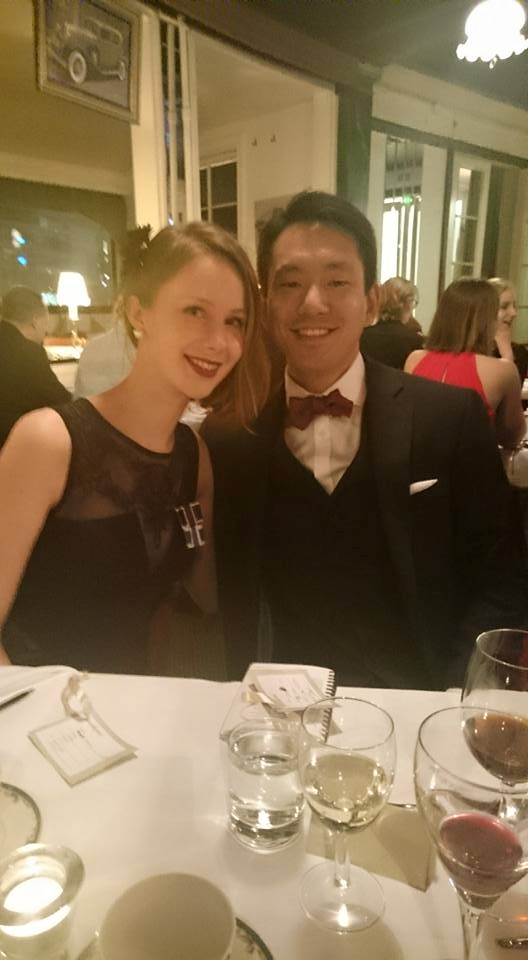 Me and Helmi (girlfriend) at an academic party
Me and Helmi (girlfriend) at an academic party
How did you craft your Fulbright application? How did you sell your case and what strategies did you use to get yours awarded?
The process was very long and arduous. There are lots of things you have to do and lots of recommendations. I went through many drafts including different motivation essays and research proposals.
I got to know my recommenders well. My undergraduate thesis advisor, James Steintrager, was a big role model for me. He was actually a Fulbright scholar himself.
As a student, how do you know what professor has completed a Fulbright? How do you find out?
I just happened to ask, and it turned out that my professor was one. In fact, many professors do complete Fulbright programs. Through word of mouth, if you ask your advisor in your department, they probably know who’s done a Fulbright.
How did you describe your project and what you wanted to do?
I described it as looking through primary sources that had been studied by my advisor and seeking to develop an American and Nordic collaborative effort. I think that’s the thing they are interested in: how you can connect different countries and, in my case, there was already an active Nordic community across national borders, interested in my topic.
How did your research contribute to a cultural exchange?
It helps when your research has an element of cultural ambassadorship. I included that in my project because I believe that’s the way that research should be done. Especially when it’s a very closed field like mine, 4th-century, Egyptian literature. The topic is not something that lots of people study, so it helps to have a mindset that you are working alongside different partners in your area.
Why does is Finnish government invested in this topic? Why is Finland interested in Egyptian literature?
The Finnish government cares about this topic because they have a Coptic collection in Finland, including papyri and parchment that remain unpublished. My advisor and other colleagues have been working on related Coptic material in early Christianity since the 80s. It’s something that has boosted Finland into an international reputation.
The Finnish government has been investing in this and similar projects since the 80s.The reason? I think that Europeans tend to have a different mentality from Americans. They don’t think, what is the benefit of this? They sort of think, what can we learn? Is there something to be learned?
That’s the litmus test they use when it comes to research in Finland, is the research valuable to those who are interested in it?
What skills are required to work with papyri and other related primary sources?
We are looking into unpublished papyri and there is a lot of interest in it because anyone in the field can learn from this finding. In order to study it, you need the material to be published. Yet, before you can study it you need to have very good language skills to unpack the content in the sources. For this reason, the project has always received investment and funding.
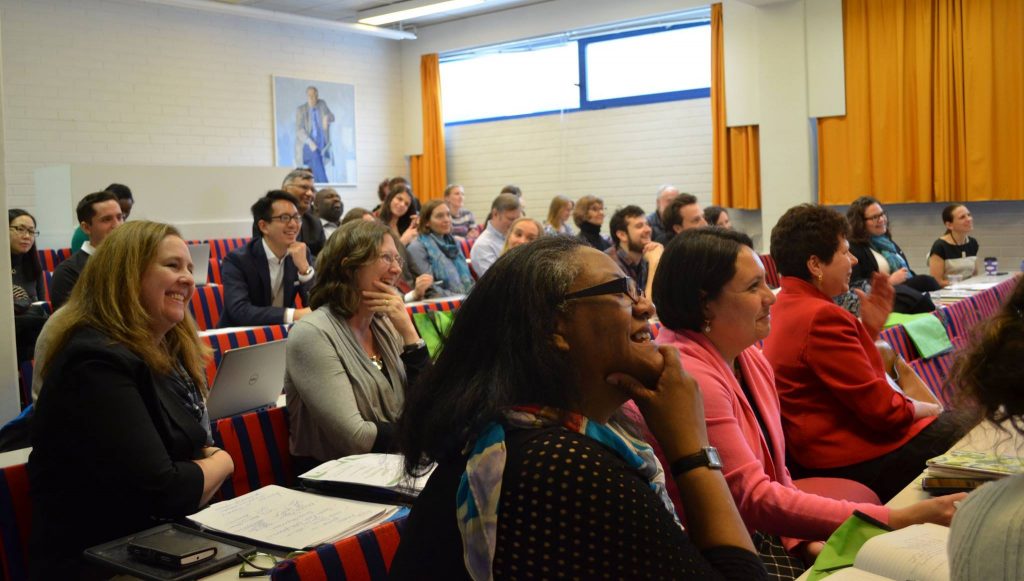 Fulbright seminar (upon arriving in Finland)
Fulbright seminar (upon arriving in Finland)
How many languages do you speak that are related to your research with primary works?
Manichaean texts are studied in a number of languages. I am able to read Ancient Greek, Latin, middle Iranian/Persian languages, Arabic, Hebrew, Coptic, and classical Chinese and have a fair grasp of French, German, and Italian. Many of these languages, I’ve been learning in the past years and during the Fulbright period. You have to know the ancient languages fairly well in order to understand the ancient primary sources.
How do you find the time to learn so many languages? What’s your process?
You surround yourself with people who are interested in the languages and you read literature with them. The nature of the texts is that they are written in such a way that reflect the way that in the ancient world there wasn’t this idea of one person speaking this one language, but rather, people spoke many different languages. One text might be in three different languages and they might be studied in three different languages. So you may have French commentary, a German commentary, and an English commentary. You sit down with a Hebrew text, Arabic text, and a Coptic text and you read the English, French, and German commentaries together and then in my case, you might have someone discuss it in Finnish, so you many have several different languages going on at the same time when you read one text. Once you get into this groove, you start picking up the language. You might also start studying some of the languages. I picked up Arabic and Hebrew. Once you learn one, the language family becomes a bit easier to grasp.
Much of it is self-taught. In my case, the Master’s program exposed me to some courses where I could learn some of these languages. The focus of my Master’s program is on the comparative study of emergent (Rabbinic) Judaism, Christianity, and Islam. There were thus teachers in Coptic, Greek, Latin, Arabic, Jewish Babylonian Aramaic, Akkadian, several ancient languages so I had those classes available and I had reading groups at the university as well as my own independent learning.
How does this connect to the application for the Marshall?
For the Marshall, I was using my English Literature background. For that application, I focused on Early Republic history. Specifically, American and British literature. So I was focusing on reading about early nationalism in the Early Republic of America. I was thinking of transatlantic studies, reading British and American literature comparatively, and trying to see what kinds of economic theories could emerge by reading these sources side by side.
What were you hoping to do?
The Marshall allows you choose from 2 Master’s programs that are each, one year long, or 1 Master’s program that is two years long. I was interested in the first option because my thinking was that I could expand my research knowledge in the field of English literature. So I was hoping to begin to do more theory-oriented research related to Britain and America at Warrick, then move to the University of Oxford from where I could look more closely at British literature in the early 19th century.
Did you apply to both at the same time?
Yes.
You were awarded the Fulbright and were a Finalist for the Marshall. What tips would you give students who want to pursue a Marshall?
The Marshall was another post-war creation. Read their website and learn about the beginnings of the Marshall scholarship and the special relationship between the US and the UK. Understanding the history of this relationship is critical to consider when applying. In fact, they ask you to describe what the special relationship is in one of their essays.
Some of my friends have gotten the Marshall through different universities and what I’ve noticed they are interested in is the relationship between America and the UK. What are you adding to the special relationship? How does your research probe and challenge the special relationship? In my case, I didn’t especially develop my research topic to suit this, but I was working on my undergrad thesis trying to find a way to relate it to the question.
I found this research field in transatlantic literature, exchange, and proto-nationalism and was hoping to connect my findings to the modern relation between British and American writings and the British and American political system. This is something that they are very interested in.
The Marshall, although better funded than the Fulbright, would have required that I move to 2 different cities within one year. It is designed for people committed to British-American related fields.
I wanted more of an international experience. In the ancient world, things were very messy. There wasn’t one location or one language.
The Fulbright worked out much better for the type of work I wanted to do. I was able to get that international feeling just being among different scholars and learning a language that wasn’t English. Being exposed to different languages is something I really value. I would have gone for the Fulbright had both opportunities manifested at the same time.
With the Marshall, they want you to stay in the UK.
What advice would you give students who are contemplating a Masters through a Fulbright?
Master’s program: Look for opportunities that interest you. I was drawn to the pan-Nordic emphasis of this Master’s program, which include universities in Norwary, Sweden, Denmark and Finland and you travel to each university for 1 week for a contact seminar. I was interested in meeting different professors, developing a relationship with them and exploring if their research was compatible with mine so I could pursue a Ph.D with them afterward.
Doing research: look at what’s unique about the country. Regarding Finland, not many people know that there is this papyri in Finland; you wouldn’t think to look here, but there is a lot to be published in Finland. Look for unique sources or unique circumstances. Some of my colleagues want to come here specifically to study the Arctic or to do Cardiac Research in the Finnish population because they are a rather close society; they have a rather uniform gene pool. Something like this gives a uniqueness to your research approach.
Generally, whether you are going for a Masters or a research-oriented project, the biggest thing is thinking of being a cultural ambassador. What are you adding to the local research community and the community in general?
I noticed that all the Fulbrighters when they got there, were interested in Finnish culture. We all had some language background or were interested in learning it while we were there. We were interested in the culture, technology, anything that was Finnish. We generally had an idea of what we were interested in.
That’s the biggest thing. You have to be interested in the country and the culture.
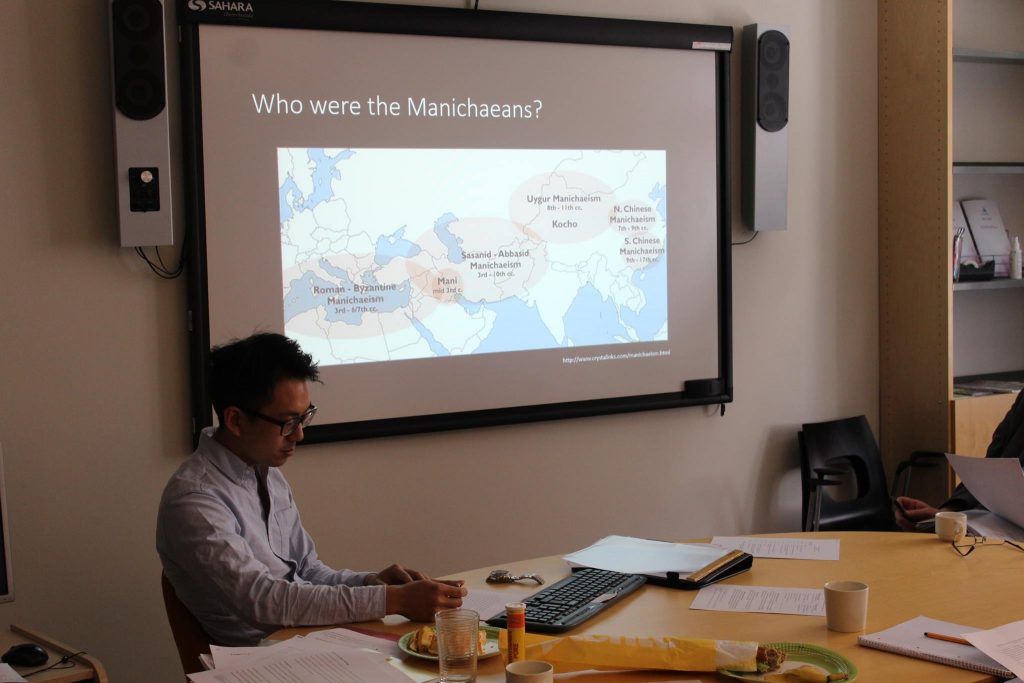 Master’s Thesis Presentation about Manichaens
Master’s Thesis Presentation about Manichaens
Why is it important to focus on connections?
It comes from this idea that the Fulbright comes from a post-war setting. So, there is something that is nationalistic about it. The people who work at the Fulbright center do want to see something that relates America and their respective country. It might be a bit of an old argument but it does still apply.
I think it’s still about prestige and about uniting researchers in different countries with each other. If you think about how after the war, countries were so divided, through the Fulbright process, you can rebuild relationships. We are more advanced now, but the idea of understanding, and collaboration is still something they want to work on.
For you, what came first, the region or the topic?
I think they came at the same time. I was already interested in a couple of topics and in religious studies, in particular. When I found my advisor, I explored my advisor’s interests to see if they would be a good fit.
You mentioned earlier that the Fulbright experience is about a relationship, about collaborating. What have you brought to Finland as a contribution?
At this point, I’ve taken up a teaching degree in Finland. I’m studying to be a teacher in English, Latin and Religious Studies for secondary school. I want to contribute as someone who specializes in these fields, as someone who has done some research here and teach high school students within a realm of relatively good expertise.
Also, learning Finnish is another contribution. I would like to contribute to different publications in the language by collaborating with Finnish researchers. More specifically, I would like to publish in American journals alongside Finnish collaborators.
I’m still working on these contributions. They are not fully accomplished yet, but I’ll continually work on them.
If I were to ask you, how has the Fulbright process changed you? Have you grown as a result of this experience in Finand?
Yes. I’ve become a better researcher; I’ve become more aware of international relations, and I’ve become aware of Europe in general. I’ve come to value my time at UCI more than I had expected. I think this is because while being in Finland, I’ve become aware of the different institutional settings and how universities work in America versus in Europe and the role of politics in these settings. The EU was rather elusory to me while I was in America, even though I had worked in German and French and had even received a scholarship from the European Studies Department at UCI. Being here you learn so much about every country. You see the U.S. in a different light, not only in light of the recent election, but reading about your own country while being abroad is also a learning experience. You see first hand, how the outside world processes your country’s politics.
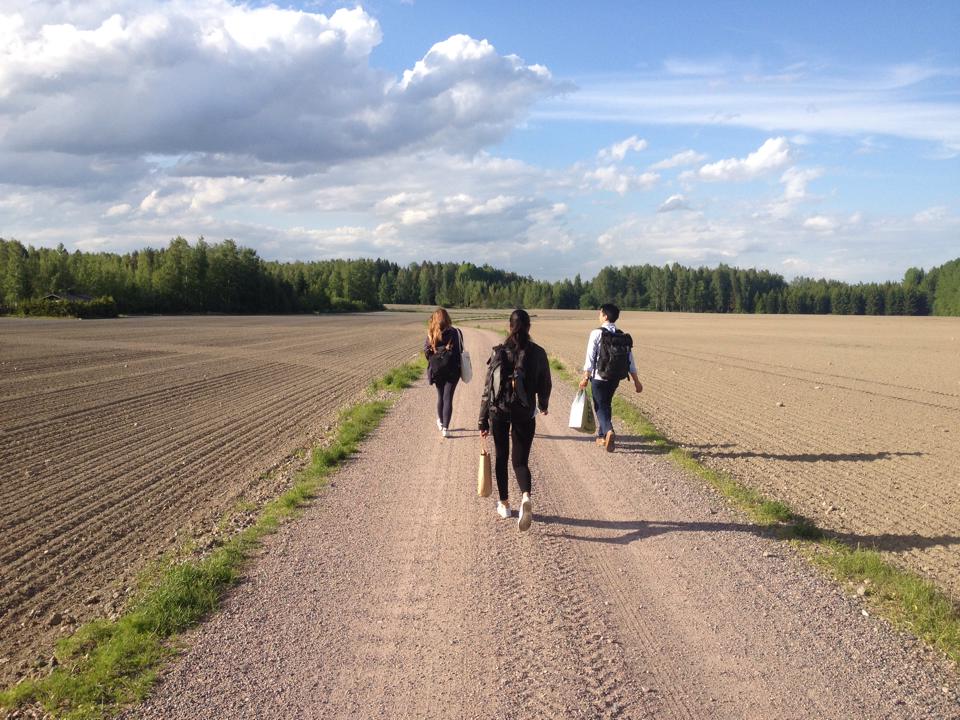 Traveling with some friends to a cottage
Traveling with some friends to a cottage
Do you feel like being abroad made you more patriotic and brought you closer to America or distanced you?
I think I’ve become more of both. I’m more well-informed and in general, it’s made me a better American. I can better compare the history of America vs. other countries and I’ve had many opportunities to talk about this. I’ve met many Europeans who are interested in learning about how Americans think of their own country in light of recent events.
Especially as an Asian-American, it is shocking for Europeans to think of Americans as not being white, male and fat. I get that all the time. Most people think I’m Chinese. They start talking to me in an Asian language that they’ve learned. I tell them, I’m American, actually. I do speak Mandarin, though. It’s an educational process for Europeans as well. Thanks to the program, they get to meet many different types of Americans.
What is next for you?
In the end I would say, research. I find research to be very rewarding. It is hard work, sometimes solitary work and you can also meet a lot of people. In the end, we share the research with people so it’s never completely solitary. It’s as solitary as you want to make it, I would say. Some people work alone and it’s detrimental to their social life. But, if you take it upon yourself to connect with others then it becomes a very cooperative, rewarding work. This applies to whether you are working as a researcher or a teacher. I see myself teaching in Finland, and I would be satisfied either way, working in research or as a teacher. After all, in Finland, a teacher is a researcher. You have to have a Masters degree to teach in Finland.
Do you have any final words of encouragement for prospective candidates?
Many students seem too daunted by the prestige and the long application process of big scholarships that they disqualify themselves before applying. Just go for it. The road is long, but the journey is well worth the trials. Listen closely to your advisors and, most importantly, stay curious.
I want to say that I’m really grateful for SOP. They gave me a lot of confidence through the preparation process and the interview drills. They gave me so much information about what I had to do. So I’m very grateful that SOP is there in UCI and that you guys are so dedicated to helping students out.
If you would like to learn more about Kenneth’s research and experiences, he can be contacted at kenneth.w.p.lai at gmail.com




